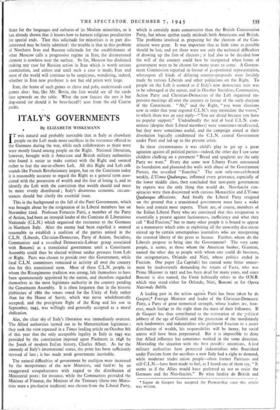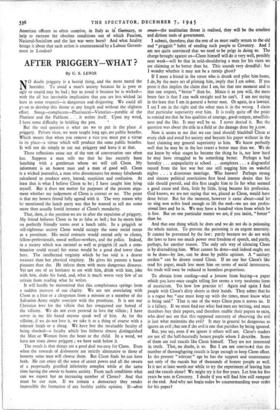ITALY'S GOVERNMENTS
By ELIZABETH WISKEMANN
yr was natural and probably inevitable that in Italy as elsewhere
people on the Left made more sacrifices in the resistance offered to the Germans during the war, while such collaborators as there were were mostly found among people on the Right. National liberation, however, brought with it Arrierican and British military authorities who found it easier to make contact with the Right and seemed rather to fear the out-at-elbows Left. All this Right and Left talk sounds like French Revolutionary jargon, but on the Continent today it is reasonably accurate to regard the Right as a general term asso- ciated with the possession of wealth and the fear of losing it, and to identify the Left with the conviction that wealth should and must be more evenly distributed ; Italy's disastrous economic circum- stances should but clarify the essential issue.
This is the background to the fall of the Parri Government, which was brought about by the resignation of its Liberal members late on November 22nd. Professor Feruccio Parri, a member of the Party of Action, had been an intrepid leader of the Comitato di Liberazione Nazionale (C.L.N.) which organised the resistance to the Germans in Northern Italy. After the enemy had been expelled it seemed reasonable to establish a coalition of the parties united in the C.L.N. (Liberals, Christian-Democrats, Party of Action, Socialists, Communists and a so-called Democratic-Labour group associated with Bonomi) as a transitional government until a Constituent Assembly could thus be elected without undue pressure from Left or Right. Perri was chosen to preside over this Government, while local C.L.N. committees remained in activity all over the country also for this transitional term. Most of these C.L.N. people, in whom the Risorgimento tradition was strong, felt themselves to have been spontaneously appointed by the nation, and therefore regarded themselves as the most legitimate authority in the country pending the Constituent Assembly. It is often forgotten that in the historic plebiscites of 1861 the voters voted for the Unity of Italy rather than for the House of Savoy, which was never wholeheartedly accepted, and the precipitate flight of the King and his son in September, 1943, was willingly and generally accepted as a moral abdication.
Alas, the clear sky of Italy's liberation was immediately overcast. The Allied authorities turned out to be Metternichian legitimists ; they took the view repeated in a Times leading article on October 8th of this year that the only acceptable legality in Italy in 1945 was provided by the constitution imposed upon Piedmont in 1848 by the Jonah of modern Italian history, Charles Albert. As for the anomaly of Italy's international status, the point has been sufficiently stressed of late ; it has made weak government inevitable.
The natural difficulties of government by coal4ion were increased by the inexperience of the new Ministers, and further by an exaggerated scrupulousness with regard to the distribution of Ministerial posts: for instance, while the Communists provided the Minister of Finance, the Minister of the Treasury (these two Minis- tries were a pre-fascist tradition) was chosen from the Liberal Party, which is certainly more conservative than the British Conservative Party, but whose epithet easily misleads both Americans and British. The problems involved in preparing for the election of the Con- stituent were great. It was important that as little time as possible should be lost, and yet there were not only the technical difficulties of drawing up the lists of electors ; it had also to be decided how the will of the country could best be interpreted when forms of government were to be chosen for many years to come. A Govern- ment Commission reported in favour of proportional representation, whereupon all kinds of delaying counter-proposals were lavishly made by various Liberals and other politicians on the Right. To people on the Left it seemed as if Italy's new democratic start was to be sabotaged at the outset, and in October Socialists, Communists, Action Party and Christian-Democrats of the Left organised im- pressive meetings all over the country in favour of the early election of the Constituent. " Ah," said the Right, "you 'want elections now in order that your regional C.L.N.'s may intimidate the voters," to which there was an easy reply—" You are afraid because you have no popular support." Undoubtedly the zeal of local C.L.N. com- mittees (despite their Liberal members) were sometimes misdirected, but they were sometimes useful, and the campaign aimed at their dissolution logically condemned the C.L.N. central Government under Parri and led up to the present crisis.
In these circumstances it was child's play to get up a great agitation against all political parties—indeed, the other day I saw some children chalking on a pavement "Bread and spaghetti are the only Party we want." Every day some new Liberty Front announced its foundation and plastered the walls with abuse of the Government Parties, the so-called " Esarchia." The now only-too-celebrated weekly, L'Uomo Qualunque, inflamed every grievance, especially of the lower middle class, then concluded that non-party government by experts was the only thing that would do. Neo-fascist con- spiracies were then discovered with curious Monarchist and L'Uorno Qualunque affiliations. And finally the Liberal Party resigned on the ground that a transitional government must have a wider basis and contain more experts. There are, of course, members of the Italian Liberal Party who are convinced that this resignation is essentially a protest against factiousness, inefficiency and what they call "Red Fascism," but to many other people it is bound to appear as a manoeuvre which aims at exploiting all the unworthy discontent stirred up by certain unscrupulous journalists who are interpreting the restored liberty of the press as licence. Further, whom do the Liberals propose to bring into the Government? The very same people, it seems, as those whom the American banker, Giannini, named the other day as people with whom one could do business, the octogenarians, Orlando and Nitti, whose politics ended in Fascism. One paper (La Capitak) has caused some bitter amuse- ment by inadvertently demanding the return of Facta, who was Prime Minister in 1922 and has been dead for many years, and since Bonomi is also named, the Unita habitually refers to the O.N.B. which may stand either for Orlando, Nitti, Bonomi or for Opera Nazionale Balilla.
A leading part in the action against Parri has been taken by de Gasperi,* Foreign Minister and leader of the Christian-Democrat Party, a Party of great numerical strength, whose leaders are, how- ever, much farther to the right than the mass of their followers. If de Gasperi has thus contributed to the restoration of the Dolitical jobbery of the age of Giolitti and the protection of the inordinately rich landowners and industrialists who preferred Fascism to a luster distribution of wealth, his responsibility will be heavy, for social unrest will have been perpetuated. But it is impossible to deny that Allied influence has sometimes worked in the same direction. Misreading the situation with the best possib!c intentions, A lied military authorities have protected industrialists who flourished under Fascism from the sacrifices a new Italy had a right to demand, while moderate trades union people—often former Partisans and still C.L.N.—have been made to feel, as I heard one of them say, "It seems as if the Allies would have preferred us not to resist the Germans and the Neo-fascists." By what fatality do British and *Signor de Gasperi has accepted the Premiership since this article was written. American officers so often contrive, in Italy as in Germany, to help to recreate the obsolete conditions out of which Fascism, National-Socialism and the last war were born? And what fatality brings it about that such action is countenanced by a Labour Govern- ment in London?































 Previous page
Previous page